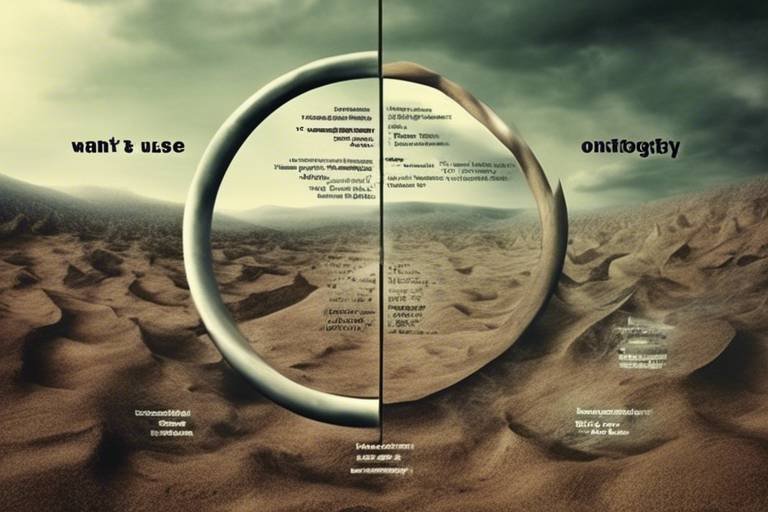Does Ontology Hold the Answers to Existential Questions?
Have you ever found yourself staring into the abyss, pondering the very essence of existence? You're not alone! Many of us grapple with the big questions: Why are we here? What does it mean to exist? Is there a purpose to our lives? These existential inquiries have puzzled philosophers, scientists, and thinkers for centuries. At the heart of this exploration lies ontology, the philosophical study of being and existence. But can ontology really provide us with the answers we seek? In this article, we will dive deep into the relationship between ontology and existential questions, exploring how ontological frameworks can illuminate our understanding of reality and our place within it.
Ontology, derived from the Greek words 'onto' (being) and 'logia' (study), is the branch of philosophy that investigates the nature of being, existence, and reality. It's like the lens through which we can examine the fabric of the universe, peeling back layers to reveal what truly lies beneath. By engaging with ontological concepts, we can begin to unravel the complexities of existence and gain insights into our own lives.
As we embark on this journey, we'll not only define existential questions but also explore their relevance to our human experience. After all, these questions are not merely abstract musings; they resonate deeply with our everyday lives. They prompt us to reflect on our choices, relationships, and the legacy we wish to leave behind. So, let's get started on this philosophical adventure and see if ontology can indeed hold the answers to our most pressing existential dilemmas.
Ontology is more than just a philosophical term; it's a fundamental aspect of how we understand the world. It seeks to categorize and clarify the various types of entities that exist and their relationships to one another. Think of ontology as the ultimate guidebook for existence, outlining what is real and how different elements of reality interact. This section will delve into the key concepts of ontology, such as being, existence, and reality, and discuss their significance in philosophical discourse.
Existential questions are those deep, often unsettling inquiries that touch upon the essence of our being. They challenge us to confront our mortality, our purpose, and the nature of reality itself. Some common existential questions include:
- What is the meaning of life?
- Is there a higher power or purpose?
- What happens after we die?
- How do we define our identity?
These questions are not just academic; they are deeply personal and universal. They compel us to seek understanding and clarity, often leading us down paths of introspection and philosophical exploration.
The concept of being is central to ontology and serves as the foundation for understanding existence. Different philosophical traditions have offered various interpretations of being, from Aristotle's notion of substance to Heidegger's existential analysis. By examining these interpretations, we can gain a richer understanding of what it means to exist. It's like trying to solve a puzzle where each piece represents a different perspective on reality. The more pieces we gather, the clearer the picture becomes.
Throughout history, philosophers have grappled with the concept of being, each contributing unique insights. For instance, Plato's theory of forms posited that the physical world is a shadow of a higher reality, while Descartes famously declared, "I think, therefore I am," emphasizing the importance of consciousness in defining existence. These historical perspectives lay the groundwork for contemporary discussions in ontology, providing a rich tapestry of thought to draw upon.
In modern philosophy, theories such as existentialism and phenomenology have emerged, offering fresh perspectives on being. Existentialists like Sartre and Camus argue that existence precedes essence, suggesting that we create our own meaning in a seemingly indifferent universe. On the other hand, phenomenology, championed by thinkers like Husserl and Merleau-Ponty, emphasizes the subjective experience of being, focusing on how we perceive and interpret our existence. These contemporary theories challenge us to rethink our understanding of reality and our place within it.
So, how does ontology contribute to our understanding of meaning in life? By exploring the interplay between existence and significance, we can uncover how our ontological beliefs shape our values and choices. For instance, if we view life as inherently meaningful, we may approach challenges with optimism and resilience. Conversely, a nihilistic perspective may lead to feelings of despair and disconnection. Ultimately, our ontological framework influences how we navigate the complexities of existence and find meaning in our experiences.
Despite its profound insights, ontological inquiry is not without challenges. Abstract concepts and subjective interpretations can complicate discussions around existence. For instance, the ambiguity surrounding the concept of existence itself can lead to confusion and misinterpretation. Additionally, the balance between subjective experiences and objective realities poses a significant challenge in ontology.
The ambiguities surrounding existence can make it difficult to arrive at definitive conclusions. What does it mean to "exist"? Is existence merely a physical state, or does it encompass consciousness and experience? These questions highlight the complexity of ontological discussions and their implications for our understanding of existence.
Finding a balance between subjective experiences and objective realities is another challenge in ontology. While our personal experiences shape our understanding of existence, they can also lead to biases and misinterpretations. Striking a balance between these two perspectives is crucial for a comprehensive understanding of being.
Understanding ontology has far-reaching implications across various fields, including psychology, ethics, and artificial intelligence. In psychology, for instance, ontological insights can inform therapeutic practices by helping individuals explore their beliefs about existence and meaning. In ethics, ontology can guide moral reasoning by clarifying the nature of beings and their rights. Furthermore, in the realm of artificial intelligence, ontological frameworks can enhance our understanding of machine consciousness and the ethical implications of creating sentient beings. By integrating ontological insights into these fields, we can foster a deeper understanding of ourselves and the world around us.
- What is ontology? Ontology is the philosophical study of being, existence, and reality.
- Why are existential questions important? They help us explore our purpose and the meaning of life, prompting personal reflection and growth.
- How does ontology relate to meaning? Ontology helps us understand how our beliefs about existence shape our values and the significance we find in life.
- What challenges does ontology face? Challenges include ambiguities in existence and balancing subjective experiences with objective realities.

Understanding Ontology
Ontology, at its core, is a branch of philosophy that delves into the very essence of being, existence, and reality. It poses fundamental questions about what it means to exist and what kinds of things exist in the universe. Think of ontology as the framework that helps us categorize and understand the world around us. It’s like a map that guides us through the complex terrain of existence, helping us make sense of our place within it. Without ontology, we might find ourselves lost in a sea of abstract concepts, struggling to grasp the nature of our reality.
The significance of ontology in philosophical discourse cannot be overstated. It serves as a foundational element in various philosophical discussions, influencing fields such as metaphysics, epistemology, and even ethics. By examining the nature of existence, ontology allows us to engage with profound questions about the universe and our role in it. For instance, consider the question: What does it mean to be? This question is not just a philosophical exercise; it has real implications for how we live our lives and interact with others.
One of the key aspects of ontology is its focus on categorization. Ontologists seek to classify entities and their relationships, which can lead to a clearer understanding of the world. This classification can be broken down into different categories, such as:
- Concrete Entities: Physical objects that exist in the world, like trees, cars, and people.
- Abstract Entities: Non-physical concepts such as numbers, ideas, and emotions.
- Relations: The connections and interactions between entities.
By exploring these categories, ontologists can uncover the underlying structures that shape our understanding of existence. This exploration is not merely academic; it has practical implications for how we approach various fields, from science to art. For example, in science, a clear ontological framework can help researchers define what constitutes a valid experiment or observation, thereby enhancing the integrity of their findings.
Moreover, ontology also addresses the nature of properties and the classifications of entities. It raises questions about whether properties exist independently of the objects they characterize. This can lead to discussions about universals and particulars, which are crucial for understanding the essence of things. Consider the color red: is it merely a property of an apple, or does it exist independently in some abstract realm? Such questions challenge our perceptions and push us to think critically about the nature of reality.
In summary, ontology is not just an academic pursuit; it is a profound exploration of the very fabric of existence. It invites us to question our assumptions, challenge our beliefs, and ultimately gain a deeper understanding of ourselves and the universe we inhabit. As we navigate through life, having a solid grasp of ontological principles can illuminate our path, helping us to make sense of the complexities around us.

Existential Questions Defined
Existential questions are the profound inquiries that probe into the very essence of human existence. They challenge us to reflect on our purpose, the nature of our being, and the significance of our experiences. These questions are not just academic musings; they resonate deeply within our daily lives, often surfacing during moments of introspection or crisis. Think about it: when was the last time you pondered, "Why am I here?" or "What is the meaning of life?" Such inquiries can feel overwhelming, yet they are essential for personal growth and understanding.
At their core, existential questions can be categorized into several key themes:
- Purpose: What is my purpose in life?
- Identity: Who am I, and what defines me?
- Mortality: What happens after death?
- Freedom: How free am I to make my own choices?
- Connection: What is my relationship with others and the universe?
These themes are not isolated; they intertwine and influence one another. For instance, our understanding of purpose can shape our identity, while our perceptions of mortality can redefine our values and choices. The beauty of existential questions lies in their ability to foster dialogue and reflection, pushing us to explore the depths of our consciousness.
Moreover, the relevance of these questions extends beyond personal contemplation. They are crucial in various fields, including psychology, philosophy, and even art. Artists often grapple with existential themes, creating works that reflect the human condition and provoke thought. Similarly, psychologists may use existential questions to help clients navigate feelings of despair or confusion, guiding them towards a path of self-discovery.
In essence, existential questions are the compass that guides us through the maze of life. They encourage us to seek clarity amidst chaos and find meaning in our experiences. As we navigate through these inquiries, we may not always find definitive answers, but the journey itself can lead to profound insights and a deeper understanding of our place in the world.

The Nature of Being
When we dive into the nature of being, we’re essentially peeling back the layers of what it means to exist. Imagine existence as a vast ocean, with each wave representing a different aspect of being. Philosophers have grappled with this concept for centuries, asking questions that seem simple yet are profoundly complex: What does it mean to be? How do we define existence? Is being merely a state of being alive, or does it encompass something deeper?
At its core, the nature of being invites us to explore various interpretations. For instance, some philosophers argue that being is tied to consciousness—the idea that self-awareness and the ability to reflect on our existence is what truly defines us. Others, however, take a more materialistic approach, suggesting that being is simply a matter of physical presence in the universe. This divergence in thought highlights the rich tapestry of philosophical discourse surrounding existence.
To further understand the nature of being, we can consider different philosophical schools of thought:
- Existentialism: This perspective emphasizes individual experience and the inherent meaninglessness of life, positing that it’s up to each person to create their own meaning.
- Phenomenology: This approach focuses on the study of structures of consciousness as experienced from the first-person point of view, emphasizing how we perceive our existence.
- Realism: This viewpoint asserts that the world exists independently of our perceptions, suggesting that being is grounded in an objective reality.
These interpretations not only shape philosophical discussions but also influence how we perceive our own existence. For instance, existentialism can lead one to feel a sense of liberation, as it suggests that we are free to define our purpose. In contrast, a realist approach might instill a sense of responsibility to understand the world around us as it is, independent of our subjective experiences.
Moreover, the nature of being is intricately linked to our understanding of time and change. As we move through life, our sense of self evolves, reflecting the dynamic nature of existence. This brings us to an important question: Does our being change with our experiences, or is there a core essence that remains constant? Philosophers like Heraclitus famously stated, "You cannot step into the same river twice," emphasizing that change is the only constant in the universe. This perspective challenges us to think about how our experiences shape our identity and existence over time.
Ultimately, the nature of being is not just an abstract concept confined to philosophical texts; it has real-world implications. Our understanding of existence influences our relationships, our decisions, and even our mental health. Recognizing the complexity of being can lead to greater self-awareness and empathy towards others, fostering a deeper connection to the world around us.
In summary, the nature of being is a multifaceted concept that encourages us to reflect on our existence and the meanings we attach to it. By engaging with these philosophical inquiries, we not only enrich our understanding but also empower ourselves to navigate the complexities of life with a more profound sense of purpose.

Historical Perspectives on Being
Throughout the ages, the concept of being has intrigued philosophers, prompting them to explore its depths and nuances. The journey into the historical perspectives on being is like peeling an onion; each layer reveals more complexity and richness. From the ancient Greeks to modern thinkers, various schools of thought have shaped our understanding of existence.
In ancient philosophy, Plato introduced the idea of ideal forms, suggesting that what we perceive in the physical world is merely a shadow of a more profound reality. For Plato, true being resided in these abstract forms, which were unchanging and eternal. His student, Aristotle, took a different route, emphasizing substance and the tangible world. He argued that being is not just about abstract ideals but also about the essence of things in the natural world. This shift laid the groundwork for centuries of ontological exploration.
Fast forward to the medieval period, where St. Augustine and later, Thomas Aquinas, synthesized Christian theology with Aristotelian philosophy. They posited that being is fundamentally tied to the divine, asserting that God is the ultimate source of all existence. This perspective introduced a metaphysical dimension to the discussion of being, intertwining existence with faith and spirituality.
As we moved into the modern era, philosophers like René Descartes and Immanuel Kant brought new dimensions to the debate. Descartes famously declared, "I think, therefore I am," emphasizing the role of consciousness in defining existence. Kant, on the other hand, introduced the idea that our understanding of being is shaped by our perceptions and cognitive structures. He argued that while we can know things as they appear to us, the "thing-in-itself" remains elusive, complicating our grasp of true existence.
In the 19th and 20th centuries, existentialists like Søren Kierkegaard and Jean-Paul Sartre challenged previous notions by focusing on individual experience and the inherent absurdity of life. They posed questions such as, "What does it mean to exist?" and "How do we find meaning in an indifferent universe?" This shift towards personal experience and subjectivity marked a significant departure from earlier ontological discussions.
The table below summarizes some key historical figures and their contributions to the understanding of being:
| Philosopher | Key Contribution |
|---|---|
| Plato | Introduced the concept of ideal forms. |
| Aristotle | Emphasized substance and the essence of things. |
| St. Augustine | Linked being with divine existence. |
| René Descartes | Highlighted the role of consciousness in existence. |
| Immanuel Kant | Explored the limits of our understanding of being. |
| Søren Kierkegaard | Focused on individual experience and meaning. |
| Jean-Paul Sartre | Examined the absurdity of existence. |
These historical perspectives on being have laid the groundwork for contemporary discussions in ontology. They remind us that the quest for understanding existence is not just an academic exercise but a deeply personal journey. As we explore these ideas, we are not only engaging with philosophical concepts but also reflecting on our own lives and the meaning we ascribe to our existence.

Contemporary Theories of Being
In the landscape of modern philosophy, the theories of being have evolved significantly, influenced by various intellectual movements and cultural shifts. Among the most notable are existentialism and phenomenology, both of which provide unique perspectives on the nature of existence. Existentialism, championed by thinkers like Jean-Paul Sartre and Simone de Beauvoir, emphasizes individual experience and the inherent freedom of choice. It posits that existence precedes essence, meaning that we are not born with a predetermined purpose; instead, we create our own meaning through our actions and decisions.
On the other hand, phenomenology, initiated by Edmund Husserl and later expanded by Martin Heidegger, focuses on the structures of experience and consciousness. It invites us to explore how we perceive and interpret our existence, suggesting that our understanding of being is deeply rooted in our lived experiences. This approach encourages a deep, introspective analysis of how we encounter the world around us and how those encounters shape our understanding of reality.
Moreover, contemporary theories of being also grapple with the implications of postmodernism, which challenges the notion of a singular, objective reality. Thinkers like Jacques Derrida and Michel Foucault argue that our understanding of existence is fragmented and influenced by language, culture, and power dynamics. This perspective raises critical questions about the nature of truth and reality, suggesting that what we consider "real" is often constructed through social and historical contexts.
As we delve deeper into these contemporary theories, we find that they often intersect and interact, creating a rich tapestry of ideas that challenge our conventional understandings. For instance, the existentialist focus on personal freedom and choice can complement phenomenological insights into the subjective nature of experience. Together, they encourage us to reflect on our own existence and the meanings we derive from it.
To illustrate these theories further, consider the following table that highlights key figures and their contributions:
| Philosopher | Theory | Key Concepts |
|---|---|---|
| Jean-Paul Sartre | Existentialism | Freedom, Choice, Absurdity |
| Simone de Beauvoir | Existentialism | Otherness, Feminism, Ethics |
| Edmund Husserl | Phenomenology | Intentionality, Lived Experience |
| Martin Heidegger | Phenomenology | Dasein, Being-in-the-World |
| Jacques Derrida | Postmodernism | Deconstruction, Différance |
In conclusion, contemporary theories of being invite us to question our assumptions about existence and reality. They challenge us to engage with the complexities of our experiences and the myriad interpretations that arise from them. By embracing these diverse perspectives, we can cultivate a richer understanding of what it means to be, ultimately leading us to confront our own existential questions head-on.
- What is ontology? Ontology is a branch of philosophy that studies the nature of being, existence, and reality.
- How does existentialism differ from phenomenology? Existentialism focuses on individual freedom and the creation of meaning, while phenomenology emphasizes the structures of experience and consciousness.
- Why is understanding contemporary theories of being important? These theories help us explore and question our assumptions about existence, reality, and meaning in life.

Ontology and Meaning
When we dive into the fascinating realm of ontology, we quickly realize that it’s not just about understanding what exists, but also about deciphering the meaning behind that existence. You might be wondering, how does something as abstract as ontology relate to our everyday lives and the significance we assign to our experiences? Well, let’s unravel this together!
Ontology provides a framework that helps us explore the intricate relationship between existence and meaning. Think of ontology as a map that guides us through the vast landscape of reality, allowing us to pinpoint where we stand in relation to our purpose and the essence of being. By examining different ontological perspectives, we can gain insights into how individuals and societies construct meaning from their experiences.
One of the key aspects of this relationship is the concept of intentionality, which refers to the capacity of our thoughts to be directed towards something. This means that when we think about our existence, we are not merely acknowledging that we are here; we are also seeking to understand why we are here and what significance our lives hold. This quest for meaning can lead us to profound existential questions such as:
- What is my purpose?
- Is there a greater meaning to life?
- How do my experiences shape my understanding of reality?
These questions are not just philosophical musings; they resonate deeply with our daily lives. For instance, consider how different cultures and belief systems interpret existence and meaning. Some might find purpose through spirituality, while others might derive meaning from relationships or achievements. This diversity in understanding highlights the subjective nature of meaning, which ontology seeks to address.
Moreover, ontology plays a crucial role in how we frame our narratives. Every story we tell about ourselves is an ontological statement about who we are and what we value. These narratives shape our identities and influence our actions. For example, if someone sees themselves as a caretaker, their ontology might lead them to prioritize relationships and community service, thereby giving their life a distinct sense of meaning.
In essence, ontology helps us to not only ask the right questions about existence but also to explore the answers that resonate with our lived experiences. By understanding the nature of being, we can better navigate the complexities of life and derive a more profound sense of meaning from our journey.
As we ponder these ideas, it's essential to recognize that the interplay between ontology and meaning is not static. It evolves as we grow, learn, and encounter new experiences. So, the next time you find yourself questioning the meaning of your existence, remember that you're engaging in a timeless dialogue that has been explored by thinkers throughout history.
- What is ontology? Ontology is a branch of philosophy that studies the nature of being, existence, and reality.
- How does ontology relate to meaning? Ontology helps us understand the nature of existence, which in turn influences how we derive meaning from our lives.
- Can ontology provide answers to existential questions? While ontology can guide us in formulating and exploring these questions, it may not provide definitive answers, as meaning can be subjective and personal.

Challenges in Ontological Inquiry
When we dive into the realm of ontology, we quickly realize that it’s not all sunshine and rainbows. In fact, ontological inquiry is fraught with a multitude of challenges that can make our heads spin. The very essence of existence is complex and layered, leading to a myriad of interpretations that can complicate our understanding. One of the primary hurdles is the abstract nature of the concepts involved. How do we even begin to define something as nebulous as "being" or "existence"? These terms can feel slippery, like trying to catch smoke with your bare hands.
Moreover, ontological discussions often grapple with the ambiguities that surround existence itself. For instance, consider the question: What does it mean to exist? Is existence merely a physical state, or does it encompass something deeper, perhaps even metaphysical? The lack of consensus on these definitions can lead to confusion and misinterpretation. It’s akin to trying to navigate through a foggy landscape—our vision is obscured, and we may end up wandering off course.
Another significant challenge is the tug-of-war between subjectivity and objectivity. On one hand, we have our personal experiences, feelings, and perceptions—these are undeniably real to us. On the other hand, there exists a world of objective realities that may not align with our subjective experiences. This dichotomy raises questions such as: How can we reconcile our personal truths with the broader, universal truths? This balancing act is crucial in ontological inquiries, as it influences our understanding of existence and meaning.
To illustrate this challenge, let's consider a table that outlines some common ambiguities and subjective interpretations in ontological discussions:
| Ambiguity | Subjective Interpretation | Objective Reality |
|---|---|---|
| Existence | Personal experience of being | Physical presence in the universe |
| Meaning | Individual purpose in life | Universal significance of actions |
| Reality | Perception of the world | Scientific understanding of the universe |
As you can see, the interplay between these ambiguities and subjective interpretations can create a tangled web that is difficult to untangle. Each perspective offers a unique lens through which to view existence, but they can also lead to disagreements and confusion. This is particularly evident in philosophical debates, where differing ontological frameworks can clash, leaving us pondering which interpretation, if any, holds the key to understanding our existence.
In summary, ontological inquiry is a complex journey filled with challenges that can leave even the most seasoned thinkers scratching their heads. The abstract nature of its concepts, the ambiguities surrounding existence, and the balancing act between subjective and objective realities all contribute to the difficulty of finding clear answers to existential questions. Yet, it is precisely these challenges that make the exploration of ontology so intriguing and essential. By confronting these complexities, we can gain deeper insights into the nature of existence and our place within it.
- What is ontology? Ontology is a branch of philosophy that studies the nature of being, existence, and reality.
- Why are existential questions important? Existential questions address the fundamental nature of human existence, purpose, and meaning, which are central to the human experience.
- What challenges do philosophers face in ontological inquiry? Philosophers often encounter challenges such as abstract concepts, ambiguities in existence, and the balance between subjective and objective realities.
- How can ontology impact real-world applications? Insights from ontology can influence various fields, including psychology, ethics, and artificial intelligence, by shaping our understanding of existence and meaning.

Ambiguities in Existence
When we dive into the murky waters of existence, we often find ourselves grappling with a myriad of ambiguities that shape our understanding of what it means to be. These ambiguities can be likened to a fog that obscures our vision, making it challenging to discern the true nature of reality. For instance, consider the question: "What does it mean to exist?" At first glance, this might seem straightforward, but as we peel back the layers, we uncover complex interpretations and perspectives that leave us pondering.
One of the primary ambiguities arises from the distinction between existence and essence. While existence refers to the state of being, essence pertains to the intrinsic nature or indispensable quality of something. This distinction can lead to philosophical debates about whether existence precedes essence or vice versa. For example, existentialists like Jean-Paul Sartre argue that humans first exist and then define their essence through actions. In contrast, essentialists believe that our essence is predetermined, and we merely discover it throughout our lives. This clash of ideas creates a rich tapestry of thought, yet it also complicates our understanding of existence itself.
Furthermore, the ambiguity of existence is often compounded by subjective experiences. Each individual's perception of existence is colored by their unique experiences, beliefs, and cultural backgrounds. This subjectivity can lead to vastly different interpretations of what it means to exist. For instance, a person raised in a collectivist culture may view existence through the lens of community and relationships, while someone from an individualistic background might prioritize personal achievement and self-identity. Such differences can create a fragmented understanding of existence, making it difficult to arrive at a universal definition.
Another layer of ambiguity comes from the philosophical debates surrounding the nature of reality itself. Are we living in a material world governed by physical laws, or is there a deeper, perhaps spiritual, essence that transcends our immediate perception? Theories such as idealism, which posits that reality is mentally constructed, contrast sharply with materialism, which asserts that only physical matter exists. These differing viewpoints not only influence our understanding of existence but also shape our existential inquiries.
In summary, the ambiguities in existence present both challenges and opportunities for philosophical exploration. They compel us to question our assumptions and delve deeper into the fundamental nature of being. As we navigate these complexities, we may find that embracing ambiguity can lead to a richer, more nuanced understanding of our existence. After all, isn't it the questions we ask and the mysteries we explore that truly define our human experience?
- What is ontology? Ontology is a branch of philosophy that studies the nature of being, existence, and reality.
- Why are existential questions important? Existential questions help us explore the meaning and purpose of life, shaping our understanding of human experience.
- How do ambiguities in existence affect our understanding? They challenge us to rethink our assumptions and can lead to diverse interpretations of reality.
- What role does subjectivity play in existential inquiries? Subjectivity influences how individuals perceive existence, leading to varied interpretations based on personal experiences and cultural backgrounds.

Subjectivity and Objectivity
In the realm of ontology, the interplay between subjectivity and objectivity is a fascinating and complex dance. At its core, subjectivity refers to our personal experiences, feelings, and interpretations of the world around us, while objectivity seeks to establish a universal truth that exists independently of individual perceptions. This dichotomy raises intriguing questions: Can we ever truly separate our subjective experiences from objective reality? Or are they inextricably linked, shaping our understanding of existence in profound ways?
To illustrate this, consider the age-old debate surrounding the color of a sunset. One person may view the vibrant hues of orange and pink as a breathtaking spectacle, while another might see it as just another evening sky. This difference in perception highlights the subjective nature of experience—what one person finds beautiful, another may dismiss. Yet, objectively, the sunset is a result of atmospheric conditions and the scattering of light. This example underscores the challenge ontologists face in trying to reconcile personal interpretations with a shared reality.
Moreover, the balance between these two perspectives is crucial for existential inquiries. While subjective experiences can enrich our understanding of life, they can also cloud our judgment, leading us to conclusions that may not hold up under objective scrutiny. For instance, if someone’s personal experience of love is overwhelmingly positive, they might overlook the complexities and challenges that can accompany such an emotion. This could lead to a skewed interpretation of what love truly is.
In contemporary philosophical discussions, many thinkers argue that a synthesis of subjectivity and objectivity is essential for a comprehensive understanding of existence. They propose that recognizing our subjective experiences can enhance our grasp of objective truths. For example, in the field of psychology, therapists often encourage clients to explore their feelings (subjective) while also grounding those feelings in objective realities, such as societal norms or biological factors. This dual approach can lead to a more nuanced understanding of human behavior and existence.
However, achieving this balance is no small feat. The challenge lies in acknowledging the limitations of our subjective perceptions while striving for an objective understanding of reality. To navigate this intricate landscape, ontologists often employ various methodologies, including phenomenology, which emphasizes the study of consciousness and the structures of experience. This approach allows for a deeper exploration of how subjective experiences shape our understanding of objective truths.
In conclusion, the relationship between subjectivity and objectivity in ontology is a dynamic interplay that significantly impacts our existential inquiries. By embracing both perspectives, we can cultivate a richer understanding of existence, one that honors our personal experiences while also seeking to uncover the universal truths that bind us all. As we continue to explore these themes, the question remains: how can we best integrate our subjective interpretations with the objective realities we encounter in our lives?
- What is the difference between subjectivity and objectivity?
Subjectivity refers to personal interpretations and experiences, while objectivity seeks universal truths that exist independently of individual perceptions.
- How does subjectivity affect our understanding of existence?
Subjectivity can enrich our understanding by adding personal depth, but it can also lead to biased interpretations if not balanced with objective perspectives.
- Can we achieve a balance between subjectivity and objectivity?
Yes, by recognizing the importance of both perspectives, we can develop a more comprehensive understanding of reality and existence.

Practical Implications of Ontology
Ontology, the study of being and existence, isn't just a theoretical exercise confined to dusty philosophy books; it has real-world implications that ripple across various fields. Think of ontology as the foundation of a building. Just as a sturdy foundation supports the entire structure, ontological principles underpin our understanding of numerous disciplines, shaping how we perceive reality and interact with the world around us.
In psychology, for instance, ontology plays a crucial role in understanding human behavior and mental processes. By exploring the nature of being, psychologists can better comprehend how individuals construct their identities and make sense of their experiences. This understanding can lead to more effective therapeutic approaches, as therapists can tailor their methods to align with the ontological perspectives of their clients. Imagine a therapist who understands that their patient's reality is shaped by unique experiences and beliefs—this insight can foster deeper connections and more impactful healing.
Similarly, in ethics, ontology informs our moral frameworks. Questions about what it means to exist and what constitutes a "good" life are deeply rooted in ontological considerations. For example, discussions about the rights of sentient beings, whether human or non-human, hinge on our understanding of existence. If we acknowledge that certain beings possess a form of consciousness or experience, we are compelled to reconsider our ethical responsibilities towards them. This interplay between ontology and ethics can lead to more compassionate policies and practices, ultimately enriching our moral landscape.
Moreover, ontology has significant implications in the realm of artificial intelligence (AI). As we develop machines that mimic human thought and behavior, we must grapple with ontological questions about what it means to "be." Can an AI possess a form of existence? If so, what rights or considerations should we afford it? These questions are not merely academic; they have profound implications for the future of technology and society. As we navigate the complexities of AI, a solid ontological framework can guide us in making ethical decisions that align with our values and understanding of existence.
To illustrate the practical implications of ontology in various fields, consider the following table:
| Field | Ontological Implications | Practical Applications |
|---|---|---|
| Psychology | Understanding identity and experience | Tailored therapeutic approaches |
| Ethics | Defining rights and responsibilities | Compassionate policies and practices |
| Artificial Intelligence | Nature of existence in machines | Ethical guidelines for AI development |
In conclusion, the implications of ontology stretch far beyond abstract thought. They influence how we understand ourselves, relate to others, and even design the technologies that shape our future. By grounding our inquiries in ontological frameworks, we can navigate the complexities of existence with greater clarity and purpose, ultimately leading to a more profound understanding of what it means to be human in an ever-evolving world.
- What is ontology? Ontology is a branch of philosophy that studies the nature of being, existence, and reality.
- How does ontology relate to psychology? Ontology helps psychologists understand how individuals construct their identities and make sense of their experiences.
- Can ontology inform ethical decisions? Yes, ontology informs our moral frameworks and helps us understand our responsibilities towards other beings.
- What role does ontology play in artificial intelligence? Ontology raises questions about the nature of existence in machines and guides ethical considerations in AI development.
Frequently Asked Questions
- What is ontology?
Ontology is a branch of philosophy that focuses on the study of being, existence, and reality. It seeks to understand the fundamental nature of entities and how they relate to each other within the broader context of existence.
- How does ontology relate to existential questions?
Ontology provides a framework for addressing existential questions by exploring the nature of existence and reality. It helps us understand concepts like purpose, meaning, and the essence of being, which are central to existential inquiries.
- Can ontology help us find meaning in life?
Yes! By examining the nature of existence and reality, ontology can shed light on what gives life meaning. It explores how our understanding of being influences our perceptions of significance and purpose.
- What are some challenges in ontological inquiry?
Ontological inquiry faces challenges such as ambiguities in the concept of existence and the balance between subjective experiences and objective realities. These challenges can complicate discussions about the nature of being and its implications for existential questions.
- How do historical perspectives on being influence modern ontology?
Historical perspectives provide a foundation for contemporary discussions in ontology. By understanding how past philosophers approached the concept of being, we can better appreciate the evolution of ideas and their relevance in today's philosophical discourse.
- What are some practical implications of ontology?
Ontology has practical applications in various fields, including psychology, ethics, and artificial intelligence. Insights from ontological studies can inform practices and theories in these areas, influencing how we understand human behavior, moral considerations, and the nature of consciousness.



















